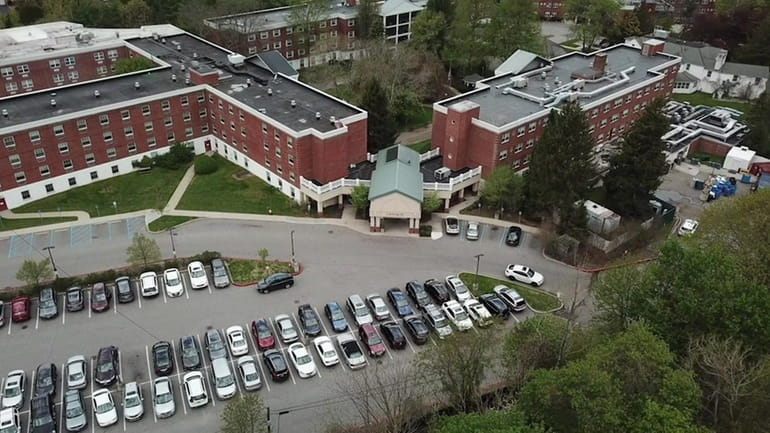Cold Spring Hills nursing home owners ordered to install independent health care monitor to oversee patient care

The owners of Cold Spring Hills Center for Nursing and Rehabilitation must provide more than $2 million in restitution to the facility and install an independent health care monitor to oversee patient care, a Nassau judge ruled Friday.
The decision ends a contentious lawsuit between Long Island's second largest nursing home operator and the state attorney general's office.
The ruling, by state Supreme Court Justice Lisa Cairo, represented a partial victory for Cold Spring Hills. The facility had been at risk of being penalized tens of millions of dollars, having a financial monitor installed and having one of its owners, Bent Philipson, removed — all of which were rejected by the court.
“The court’s order to appoint an independent health care monitor at Cold Spring Hills will substantially improve residents’ care and quality of life,” the attorney general's office said in a statement. “While we continue to review the decision and determine next steps, protecting our most vulnerable New Yorkers and ensuring nursing homes are held accountable remain our top priorities.”
WHAT TO KNOW
- The owners of Cold Spring Hills Center for Nursing and Rehabilitation must pay more than $2 million in restitution to the facility, a Nassau judge ruled Friday, settling a lawsuit filed by the state attorney general.
- The ruling also requires the installation of an independent health care monitor at Long Island's second largest nursing home to oversee patient care following allegations of extreme resident neglect during the pandemic.
- Cold Spring Hills had been at risk for being penalized tens of millions of dollars, having a financial monitor installed and having Bent Philipson, one of the owners, removed — all of which were rejected by the court.
The court must still determine the scope of the health care monitor's duties while the attorney general's office indicated it could ask the court to reconsider damages.
The judge did agree with the attorney general that Cold Spring Hills failed “to meet the standard of care” required by the state and did not “adequately contradict allegations of extreme neglect.”
The state Health Department, which was seeking revocation of the facility's operating license and the appointment of a temporary manager to run the nursing home, declined to comment.
Attorneys for Cold Spring Hills and for Philipson, a nursing home magnate who purchased the Woodbury facility in 2016, along with partner Benjamin Landa, did not respond to requests for comment.
Attorney General Letitia James filed suit against owners and operators of Cold Spring Hills in December 2022, arguing the 588-bed facility neglected resident care and skirted state laws through a fraudulent business setup elaborately designed to enrich themselves.
The complaint alleged Cold Spring Hills owners profited by diverting $22.6 million in government funding away from resident care while repeatedly cutting staff, including in the weeks before the pandemic, leading to nightmarish end-of-life scenarios.
The lawsuit sought the removal of Philipson from any involvement in the facility’s operations and a court order that Philipson and his partners pay an unspecified amount of restitution. Philipson and Landa amassed by 2020 — along with their family members — interests in 163 nursing facilities across 18 states, according to Medicare records.
In her ruling, Cairo rejected many of James' central arguments, including that Cold Spring Hills ownership engaged in “repeated and persistent” financial fraud, unapproved equity withdrawals and “unjustly enriched” themselves at the expense of facility operations.
Cairo, however, found Cold Spring Hills did engage in “misleading” facility financing and mandated four ownership entities pay a combined $2.015 million in restitution to the nursing home.
The court, Cairo wrote, will select an independent health care monitor, in consultation with both sides, before March 29. The monitor, which will oversee daily operations, would report directly to the court.
“We appreciate that Judge Cairo recognized that sufficient staffing levels are required to safeguard resident care at nursing homes,” said 1199 SEIU, the union represents more than 400 Cold Spring Hills employees. “We still believe that new management is required at the facility — both for the residents and the workers.”
Richard Mollot, executive director of the Long Term Care Community Coalition, which advocates for nursing home residents, called the appointment of an independent health care monitor “a major win” for residents and their families.
“However, the best solution would be to force a sale of this facility to ensure that residents are safe and that taxpayer money — which funds most nursing home care — is used with integrity,” Mollot said. “ … Perhaps most importantly and most troubling is that the judge repeatedly ignored the growing body of evidence showing that nursing homes are making significant profits and that most of these profits are hidden in related-party transactions.”
Families who lost loved ones at the facility in the early days of the pandemic said the ruling was insufficient.
Thomas Granito, of Huntington Station, whose 99-year-old mother, May Granito, was one of six residents to die of COVID-19 at Cold Spring Hills during a single weekend in April 2020, said ownership “is getting off very easy.”
Debra Garofalo, of Wantagh, whose mother, Julie Toves, died that same weekend at Cold Spring Hills, called $2 million “a slap in the face” to families.
“I know there was gross neglect and understaffing during that period,” Garofalo said. “This is not a great resolution to the case at all.”
With Jim Baumbach

